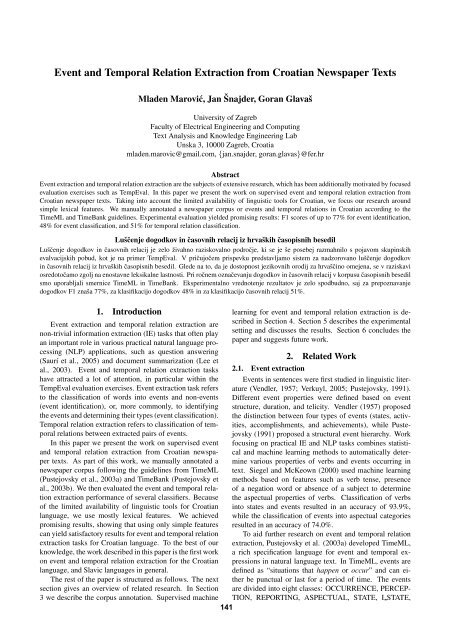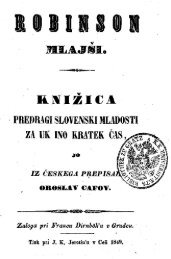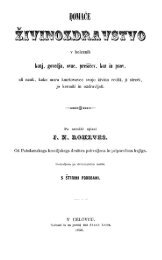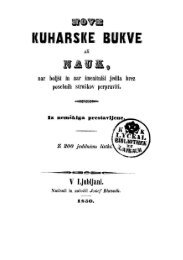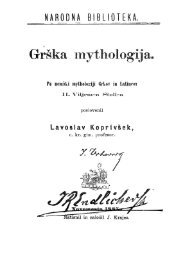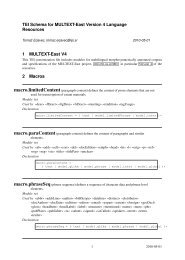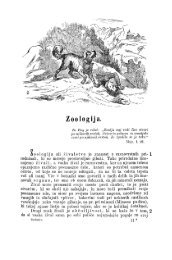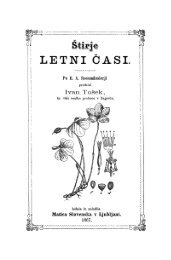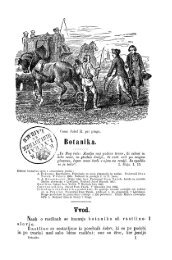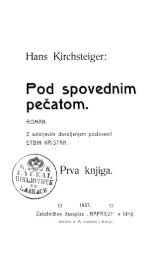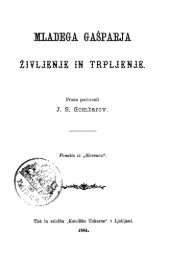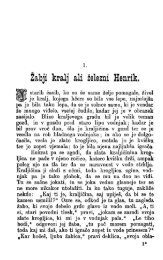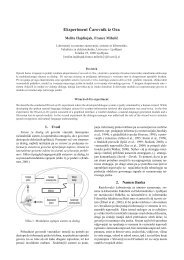Proceedings - Natural Language Server - IJS
Proceedings - Natural Language Server - IJS
Proceedings - Natural Language Server - IJS
You also want an ePaper? Increase the reach of your titles
YUMPU automatically turns print PDFs into web optimized ePapers that Google loves.
Event and Temporal Relation Extraction from Croatian Newspaper Texts<br />
Mladen Marović, Jan ˇSnajder, Goran Glavaˇs<br />
University of Zagreb<br />
Faculty of Electrical Engineering and Computing<br />
Text Analysis and Knowledge Engineering Lab<br />
Unska 3, 10000 Zagreb, Croatia<br />
mladen.marovic@gmail.com, {jan.snajder, goran.glavas}@fer.hr<br />
Abstract<br />
Event extraction and temporal relation extraction are the subjects of extensive research, which has been additionally motivated by focused<br />
evaluation exercises such as TempEval. In this paper we present the work on supervised event and temporal relation extraction from<br />
Croatian newspaper texts. Taking into account the limited availability of linguistic tools for Croatian, we focus our research around<br />
simple lexical features. We manually annotated a newspaper corpus or events and temporal relations in Croatian according to the<br />
TimeML and TimeBank guidelines. Experimental evaluation yielded promising results: F1 scores of up to 77% for event identification,<br />
48% for event classification, and 51% for temporal relation classification.<br />
Luˇsčenje dogodkov in časovnih relacij iz hrvaˇskih časopisnih besedil<br />
Luˇsčenje dogodkov in časovnih relacij je zelo ˇzivahno raziskovalno področje, ki se je ˇse posebej razmahnilo s pojavom skupinskih<br />
evalvacijskih pobud, kot je na primer TempEval. V pričujočem prispevku predstavljamo sistem za nadzorovano luˇsčenje dogodkov<br />
in časovnih relacij iz hrvaˇskih časopisnih besedil. Glede na to, da je dostopnost jezikovnih orodij za hrvaˇsčino omejena, se v raziskavi<br />
osredotočamo zgolj na enostavne leksikalne lastnosti. Pri ročnem označevanju dogodkov in časovnih relacij v korpusu časopisnih besedil<br />
smo uporabljali smernice TimeML in TimeBank. Eksperimentalno vrednotenje rezultatov je zelo spodbudno, saj za prepoznavanje<br />
dogodkov F1 znaˇsa 77%, za klasifikacijo dogodkov 48% in za klasifikacijo časovnih relacij 51%.<br />
1. Introduction<br />
Event extraction and temporal relation extraction are<br />
non-trivial information extraction (IE) tasks that often play<br />
an important role in various practical natural language processing<br />
(NLP) applications, such as question answering<br />
(Saurí et al., 2005) and document summarization (Lee et<br />
al., 2003). Event and temporal relation extraction tasks<br />
have attracted a lot of attention, in particular within the<br />
TempEval evaluation exercises. Event extraction task refers<br />
to the classification of words into events and non-events<br />
(event identification), or, more commonly, to identifying<br />
the events and determining their types (event classification).<br />
Temporal relation extraction refers to classification of temporal<br />
relations between extracted pairs of events.<br />
In this paper we present the work on supervised event<br />
and temporal relation extraction from Croatian newspaper<br />
texts. As part of this work, we manually annotated a<br />
newspaper corpus following the guidelines from TimeML<br />
(Pustejovsky et al., 2003a) and TimeBank (Pustejovsky et<br />
al., 2003b). We then evaluated the event and temporal relation<br />
extraction performance of several classifiers. Because<br />
of the limited availability of linguistic tools for Croatian<br />
language, we use mostly lexical features. We achieved<br />
promising results, showing that using only simple features<br />
can yield satisfactory results for event and temporal relation<br />
extraction tasks for Croatian language. To the best of our<br />
knowledge, the work described in this paper is the first work<br />
on event and temporal relation extraction for the Croatian<br />
language, and Slavic languages in general.<br />
The rest of the paper is structured as follows. The next<br />
section gives an overview of related research. In Section<br />
3 we describe the corpus annotation. Supervised machine<br />
141<br />
learning for event and temporal relation extraction is described<br />
in Section 4. Section 5 describes the experimental<br />
setting and discusses the results. Section 6 concludes the<br />
paper and suggests future work.<br />
2.1. Event extraction<br />
2. Related Work<br />
Events in sentences were first studied in linguistic literature<br />
(Vendler, 1957; Verkuyl, 2005; Pustejovsky, 1991).<br />
Different event properties were defined based on event<br />
structure, duration, and telicity. Vendler (1957) proposed<br />
the distinction between four types of events (states, activities,<br />
accomplishments, and achievements), while Pustejovsky<br />
(1991) proposed a structural event hierarchy. Work<br />
focusing on practical IE and NLP tasks combines statistical<br />
and machine learning methods to automatically determine<br />
various properties of verbs and events occurring in<br />
text. Siegel and McKeown (2000) used machine learning<br />
methods based on features such as verb tense, presence<br />
of a negation word or absence of a subject to determine<br />
the aspectual properties of verbs. Classification of verbs<br />
into states and events resulted in an accuracy of 93.9%,<br />
while the classification of events into aspectual categories<br />
resulted in an accuracy of 74.0%.<br />
To aid further research on event and temporal relation<br />
extraction, Pustejovsky et al. (2003a) developed TimeML,<br />
a rich specification language for event and temporal expressions<br />
in natural language text. In TimeML, events are<br />
defined as “situations that happen or occur” and can either<br />
be punctual or last for a period of time. The events<br />
are divided into eight classes: OCCURRENCE, PERCEP-<br />
TION, REPORTING, ASPECTUAL, STATE, I STATE,


